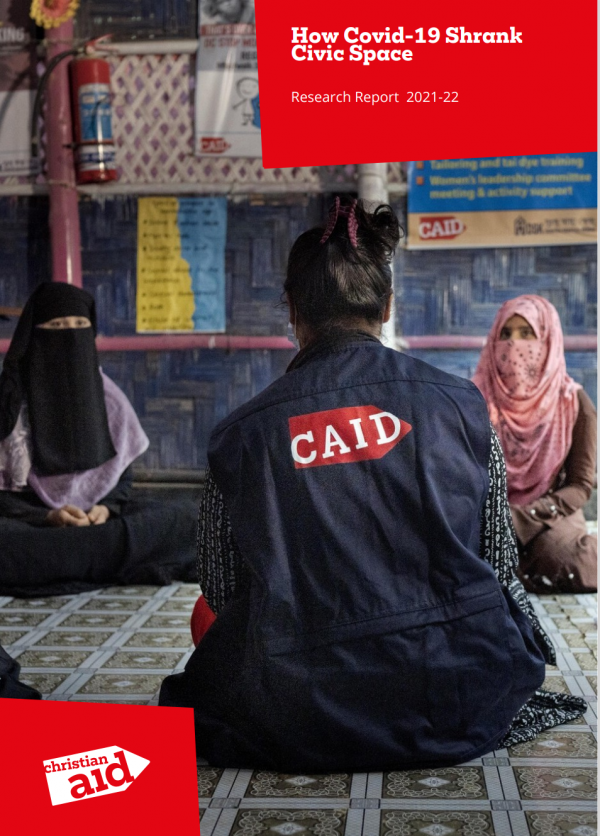
Read this report by Christian Aid into 'How Covid-19 Shrank Civic Space'.
"How has the Covid-19 pandemic impacted civic space? What has changed, who has been most affected and why? How are communities, partners, stakeholders and staff in Christian Aid programmes responding? What must be done to protect and expand this space?This new study urgently raises issues of participation, freedom of assembly, surveillance and operations in an increasingly restricted civic space since the onset of Covid-19. Some of these are long-term issues, now being exacerbated by the pandemic.
Our research gathers both primary data and long-term experience to guide our own, and our partners’ policy, advocacy and programmatic work in protecting civic space. We present primary data from Bangladesh and Nigeria, and case studies from Colombia, Israel and the occupied Palestinian territory (IoPt), Myanmar, the United Kingdom and Zimbabwe."
"KEY FINDINGS
- Civic space has shrunk for those with least power
Globally, the right to civic assembly and space has been shrinking over the past ten years. Since 2020, pandemic
restrictions have further silenced groups and individuals who were already excluded from national and international arenas. Our report shows the impact on women in rural communities in Zimbabwe and Nigeria; transgender, Dalit and Adivasi groups in Bangladesh; and indigenous communities in Colombia. They have also lost economic power, receiving little state support.
- Freedom of assembly and activism have been curtailed
In various countries there has been severe authoritarian crackdown. Governments have abused human rights and used technology to spy on activists. Even in more democratic countries there have been restrictions on civic scrutiny (especially with regards to freedom of the press), on holding governments to account and on the right to protest.
- Operational risks have increased
Many of the groups most affected by shrinking civic space have been hit by funding gaps just at a time when finance was sorely needed. Our research reveals that funds for Covid-19 responses have been channelled into humanitarian relief and social protection rather than strengthening civic space. Furthermore, a shift is taking place towards powerful private sector interests as providers of support and/or beneficiaries of funding. State denial of the role of civil society in deliveringhumanitarian assistance and relief reveals a drive to centralise power, external funding and control over aid and relief funds in the interests of allies in government and business.
- Alternative organising offers a partial solution
Alternative organising has worked well in some contexts but not others. It is seen as one aspect of a campaign, but not its full realisation. The move to online civic space has meant inclusion for many who previously had difficulty in physically attending; new opportunities for certain groups; and an increase in audience. Yet it has also brought new inequalities of access and participation for those who are digitally excluded. Use of legal challenges and human rights monitoring agencies has been successful: higher-level routes to redress and accountability may remain open when other routes have closed. This includes challenging rights abuses and pressurising certain states (although not the most autocratic regimes) into reviewing restrictive legislation and behaviours."